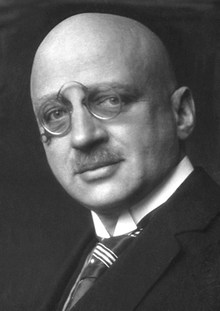
Fritz Haber
Fritz Haber (German: [ˈhaːbɐ]; 9 December 1868 – 29 January 1934) was a German chemist who received the Nobel Prize in Chemistry in 1918 for his invention of the Haber–Bosch process, a method used in industry to synthesize ammonia from nitrogen gas and hydrogen gas. This invention is of importance for the large-scale synthesis of fertilizers and explosives. It is estimated that two thirds of annual global food production uses nitrogen from the Haber–Bosch process, and that this supports nearly half the world population. Haber, along with Max Born, proposed the Born–Haber cycle as a method for evaluating the lattice energy of an ionic solid. Haber is also considered the “father of chemical warfare” for his years of pioneering work developing and weaponizing chlorine and other poisonous gases during World War I, especially his actions during the Second Battle of Ypres.
Lists containing Fritz Haber :
383 Influential People who changed the world

The world is filled with thousands of great people who have changed the world. It is not possible to list the most influential men and women in human history, but this list is an attempt to explore some of the most influential people of all time that one must know about. It can be hard…
